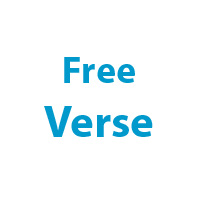What is Free Verse?
Free verse is derived from the French word 'vers libre', which literally means poetry without rhyme-scheme and any standard or fixed rhythm. Poetry that lacks a regular meter, does not rhyme, and uses irregular and sometimes very short line lengths can be confined as free verse.

Writers of free verse disregard traditional poetic conventions of rhyme and meter, relying instead on parallelism, repetition, and the ordinary rhythm and stresses of everyday discourse. In English, notable use of free verse dates back to the King James translation of the biblical Psalms and Song of Solomon, but it was not really recognized as an important new form until Walt Whitman’s Leaves of Grass (1855). Walt Whitman startled the literary world by using lines of variable length, which depended for their rhythmic effect on the repetition, balance, and variation of phrases, instead of on recurrent metric feet. After the First Word War, non-rhyming and non-metrical forms of verse have been used by most poets including T.S. Eliot, Ezra Pound, William Carlos Williams, E.E. Cummings and numberless other poets.
Published on 23 Jan. 2014 by Kedar Nath Sharma
Related Topics
Edward Estlin Cummings: Biography
William Carlos Williams: Biography
Thomas Sterne Eliot: Biography
 |
bachelorandmaster.com |